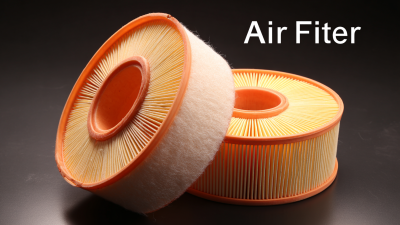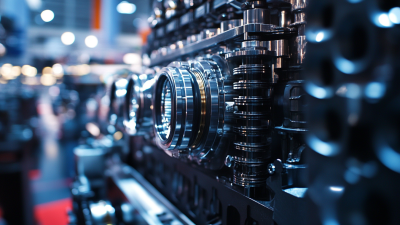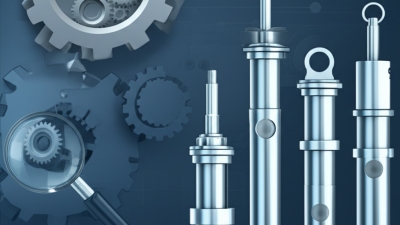 +86 13794985240
+86 13794985240
Leave Your Message
-
 CONTACT NUMBER
CONTACT NUMBER -
 CONTACT NUMBER
CONTACT NUMBER -
 CONTACT NUMBER
CONTACT NUMBER



In today's rapidly evolving industrial landscape, the efficiency of air filters has become increasingly critical as organizations strive to meet stringent air quality standards and enhance operational performance. According to a report by the Global Air Filter Market, the demand for high-efficiency air filters is projected to grow by 7.8% annually through 2026, driven by the rise in environmental awareness and government regulations. This shift highlights an urgent need for innovative solutions that not only improve air filter performance but also extend their lifespan and energy efficiency.

In this context, exploring alternative types of air filters, such as HEPA, electrostatic, and activated carbon filters, can significantly contribute to cleaner air and healthier workplace environments, thereby enabling industries to comply with regulations while reducing operational costs.
Air filters play a crucial role in maintaining indoor air quality, yet many systems underperform due to common issues that can hinder their efficiency. According to the U.S. Environmental Protection Agency (EPA), indoor air can be up to five times more polluted than outdoor air, significantly impacting health and wellness. A primary concern is the accumulation of dust, debris, and other contaminants that can clog filters. Regular maintenance is essential; a study by the American Society of Heating, Refrigerating and Air-Conditioning Engineers (ASHRAE) suggests that changing filters every 1-3 months can enhance air flow and reduce energy consumption by up to 15%.
Tip: Implement a scheduled maintenance routine and consider using high-efficiency particulate air (HEPA) filters, which can capture up to 99.97% of airborne particles.
Another common issue is the incorrect size or type of air filters being used, which can lead to air bypassing the filter and compromising air quality. A report by the Filter Manufacturers Council (FMC) found that using the right filter size is critical for optimal performance. Additionally, air filters should be selected based on specific needs, such as those with higher MERV ratings for environments prone to allergies or respiratory issues.
Tip: Consult with a professional to determine the best filter type for your environment and ensure precise fitting to maximize efficiency.
The air quality in our indoor environments significantly hinges on the effectiveness of air filter media used in HVAC systems. Recent studies reveal that the choice of filter media can enhance particle removal efficiency by over 95%, particularly for fine particulate matter such as PM2.5, which is crucial for health as it can penetrate deep into the lungs. For instance, high-efficiency particulate air (HEPA) filters, renowned for their ability to capture microscopic particles, have been shown to reduce airborne allergens and pollutants, thus improving not only air quality but also the overall well-being of occupants.
Tip: Regularly check and replace your air filters based on usage—filters in homes with pets or smokers may need changing monthly to maintain optimal performance.
Moreover, advancements in filter technologies, including electrostatic and pleated media, have made it possible to achieve better airflow while still maintaining high filtration standards. A study by the American Society of Heating, Refrigerating and Air-Conditioning Engineers (ASHRAE) emphasized that filters with a Minimum Efficiency Reporting Value (MERV) rating of 13 and above provide superior filtration capabilities suitable for various residential and commercial applications.
Tip: Consider upgrading to a filter with a higher MERV rating if you live in an area with high pollution levels, as it can significantly enhance your indoor air quality.
Innovative technologies are revolutionizing the air filter industry, enhancing both performance and efficiency. One of the most significant advancements is the integration of nanotechnology into filter materials. Nanofibers, with their incredibly small diameter, increase the surface area and capture particles more effectively than traditional media. This means that filters can trap finer pollutants, including allergens and harmful particulate matter, without significantly compromising airflow.
Another promising technology is the use of electrostatic charge in air filters. Filters that utilize this feature attract and hold dust and contaminants more effectively, providing superior filtration capabilities. This not only improves indoor air quality but also extends the lifespan of the filter by reducing the frequency of replacements. Manufacturers are also exploring smart filters equipped with sensors that monitor air quality in real-time, allowing for automatic adjustments or alerts when replacement is needed.
These innovations pave the way for a future where air filtration is not just about removing impurities, but also about providing cleaner, healthier air with greater energy efficiency. As technology continues to evolve, we can expect even more advanced solutions that address the complexities of indoor air quality management.
| Technology | Description | Filter Efficiency (%) | Lifespan (Months) | Cost ($) |
|---|---|---|---|---|
| HEPA Filters | High-efficiency particulate air filters that capture 99.97% of particles. | 99.97 | 12 | 50 |
| Activated Carbon Filters | Filters designed to absorb odors and chemicals in the air. | 85 | 6 | 40 |
| Electrostatic Filters | Filters that use an electric charge to attract and trap particles. | 90 | 9 | 35 |
| UV-C Light Filters | Filters that use ultraviolet light to kill airborne microorganisms. | 95 | 12 | 60 |
| Nanofiber Filters | Advanced filters made with nanofiber technology for high filtration efficiency. | 99 | 18 | 70 |
Maintaining and replacing air filters is crucial for ensuring optimal performance and efficiency in various applications, from industrial settings to home environments. According to industry reports, the North America Industrial Filtration Market is expected to show significant growth, with a projected compound annual growth rate (CAGR) of 6.9% from 2025 to 2032 in cleanroom HVAC systems alone. This underscores the importance of effective air filtration in maintaining air quality and operational efficiency.
To maximize air filter longevity and effectiveness, regular maintenance is essential. It is advisable to check and replace filters every 1 to 3 months, depending on usage and environmental conditions. Additionally, consider the following tips:

 Upgrading air filtration systems is increasingly recognized as a strategic investment for both environmental and operational efficiency. As air filter market projections suggest a rise to approximately $4.7 billion by 2025, a more pressing concern is the cost-benefit analysis of enhancing filtration performance. Higher efficiency air filtration systems not only reduce energy costs but also decrease the need for frequent replacements due to their superior lifespan. Advanced filtration solutions often incorporate innovative technologies that significantly enhance air quality, aligning with the growing demand for cleaner environments.
Upgrading air filtration systems is increasingly recognized as a strategic investment for both environmental and operational efficiency. As air filter market projections suggest a rise to approximately $4.7 billion by 2025, a more pressing concern is the cost-benefit analysis of enhancing filtration performance. Higher efficiency air filtration systems not only reduce energy costs but also decrease the need for frequent replacements due to their superior lifespan. Advanced filtration solutions often incorporate innovative technologies that significantly enhance air quality, aligning with the growing demand for cleaner environments.
With a compound annual growth rate of 5.9%, the air filtration market signifies a valuable opportunity for businesses aiming to optimize their operations. Investing in high-performing air filters can lead to substantial long-term savings by minimizing maintenance costs and improving overall air quality. Additionally, industries focusing on compliance with evolving regulations stand to gain a competitive edge by adopting upgraded systems. As air quality standards progress, businesses that proactively enhance their air filtration capabilities will be better positioned to meet these new requirements, ultimately benefitting from both operational efficiencies and improved public health outcomes.






